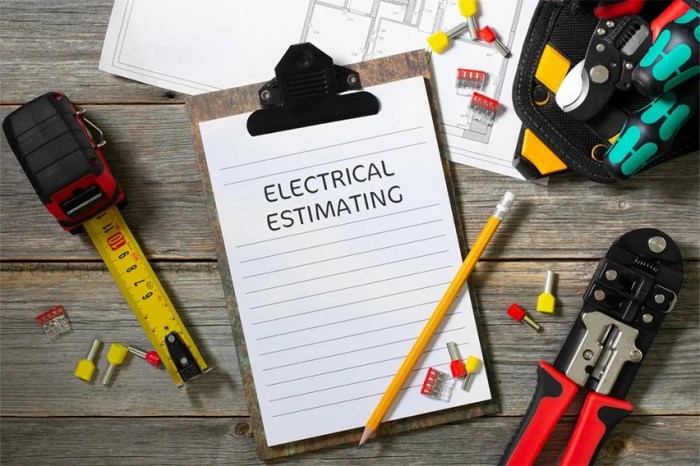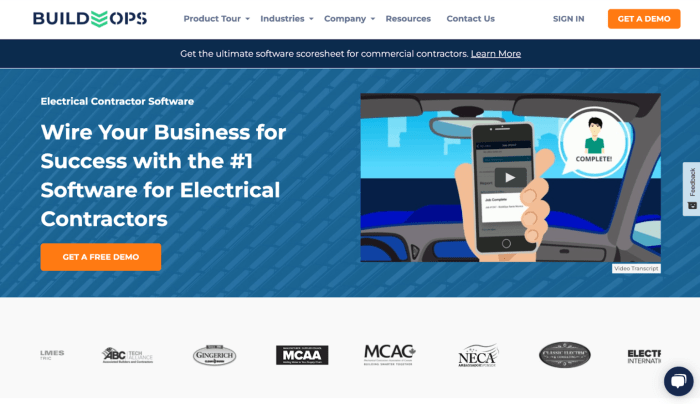Understanding the Electrical Contracting Industry

Crm for electrical contractors – The electrical contracting industry is a dynamic and essential sector, powering homes, businesses, and infrastructure. However, success in this competitive landscape hinges on more than just technical expertise; effective customer relationship management (CRM) is paramount. This section delves into the unique challenges, workflows, and CRM-related issues faced by electrical contractors, highlighting the critical role of efficient systems in boosting profitability and client satisfaction.
Electrical contractors face a unique set of challenges in managing customer relationships. The nature of the work, often involving complex projects with varying timelines and unforeseen issues, requires exceptional communication and coordination. Projects can range from small residential jobs to large-scale commercial installations, each demanding a different approach to customer interaction and project management. Balancing technical proficiency with excellent customer service is a constant tightrope walk.
Furthermore, the industry is characterized by fluctuating demand, impacting resource allocation and project scheduling, which in turn can affect customer relationships if not managed proactively.
Typical Workflow of an Electrical Contracting Business
The typical workflow of an electrical contracting business involves several key touchpoints with clients. It begins with initial contact, often through a phone call, email, or online inquiry. This is followed by a site visit to assess the project’s scope, followed by providing a detailed proposal outlining the work, costs, and timeline. Once the contract is signed, the project execution phase commences, requiring regular communication with the client to address concerns and provide updates.
Finally, the project concludes with a final inspection and payment processing. Each of these stages offers opportunities to build strong customer relationships, or conversely, to create points of friction.
Impact of Inefficient CRM Practices
Inefficient CRM practices can significantly impact the profitability and customer satisfaction of an electrical contracting business. Poor communication can lead to project delays, cost overruns, and frustrated clients. A lack of organized client data can result in missed opportunities for repeat business or upselling. Inefficient scheduling and resource management can lead to missed deadlines and decreased overall productivity.
The cumulative effect of these inefficiencies can translate into lost revenue, damaged reputation, and difficulty attracting new clients. For example, a contractor failing to promptly respond to customer inquiries may lose a job to a competitor who prioritizes communication. Similarly, mismanaging project timelines can lead to penalties and strained client relationships.
Common Customer Relationship Management Issues
Electrical contractors frequently encounter various CRM issues. These include difficulties in tracking project progress, managing multiple client interactions across different communication channels, and maintaining accurate and up-to-date client information. Another common challenge is ensuring consistent communication across the team, preventing inconsistencies in information relayed to the client. Poorly managed client data can also hinder effective follow-up for repeat business or potential referrals.
For instance, losing track of a client’s contact details can make it difficult to schedule follow-up appointments or address post-project concerns. Similarly, inconsistent messaging regarding project timelines or cost updates can lead to misunderstandings and conflict. Finally, a lack of a centralized system for managing client information and project details makes it challenging to track performance metrics and identify areas for improvement.
CRM Features Essential for Electrical Contractors

Streamlining operations and maximizing efficiency are paramount for electrical contractors. A robust CRM system offers the tools to achieve these goals, transforming how jobs are managed, technicians are dispatched, and ultimately, how profits are increased. By centralizing information and automating processes, a well-chosen CRM system can significantly reduce administrative overhead and empower your team to focus on delivering exceptional service.
Job Scheduling and Dispatching Enhancements
Effective job scheduling and dispatching are critical for maximizing technician utilization and minimizing customer wait times. The right CRM features can automate many aspects of this process, resulting in smoother operations and happier customers.
| Feature | Benefits | Potential Drawbacks | Example |
|---|---|---|---|
| Automated Scheduling | Optimizes technician schedules based on location, skillset, and job priority, reducing travel time and improving efficiency. Provides real-time visibility into technician availability. | Requires accurate data input and potentially complex setup. May not be adaptable to all scheduling scenarios. | A CRM could automatically assign a technician specializing in high-voltage work to a job requiring that expertise, while factoring in their current location and the travel time to the job site. |
| GPS Tracking and Real-time Location | Allows dispatchers to monitor technician location, ensuring timely arrival at job sites and providing accurate ETAs to customers. Improves response time to urgent requests. | Concerns about technician privacy need careful consideration and transparent communication. Requires reliable internet connectivity. | The dispatcher can see that a technician is running late due to unexpected traffic and proactively inform the customer, avoiding frustration. |
| Job Routing and Optimization | Reduces travel time and fuel costs by intelligently sequencing jobs based on geographical proximity and technician availability. Improves overall operational efficiency. | Requires accurate job location data and may not be optimal in situations with unpredictable traffic or unexpected delays. | The system might suggest a sequence of jobs clustered in a specific geographical area, minimizing wasted travel time for the technician. |
CRM Integration with Field Service Management Software
Integrating your CRM with field service management (FSM) software creates a powerful synergy, providing a comprehensive solution for managing all aspects of your field operations. This integration streamlines workflows, improves communication, and provides a single source of truth for all job-related information. For example, a technician can access job details, customer information, and even update job status directly within the FSM app, eliminating the need for manual data entry and reducing the risk of errors.
The seamless flow of information between the CRM and FSM eliminates data silos and ensures everyone is working with the most up-to-date information.
Mobile CRM App Benefits for On-Site Technicians
A mobile CRM app empowers on-site technicians with real-time access to crucial information, enhancing their productivity and improving customer service. Technicians can access customer details, job specifications, previous service history, and even inventory information directly from their smartphones or tablets. This instant access minimizes delays, reduces errors, and allows technicians to focus on completing the job efficiently and effectively.
Furthermore, the ability to update job status, submit time sheets, and capture digital signatures directly from the field simplifies administrative tasks and improves data accuracy.
Managing Equipment Inventory and Maintenance Scheduling
A CRM system can be configured to manage equipment inventory, track maintenance schedules, and generate alerts for upcoming maintenance needs. This feature is particularly useful for electrical contractors who manage a fleet of vehicles and a range of specialized equipment. The CRM can track equipment location, service history, and warranty information, ensuring that all equipment is properly maintained and ready for use.
Automated alerts for upcoming maintenance tasks prevent costly breakdowns and downtime, maximizing the lifespan of your equipment and minimizing operational disruptions. For instance, the system could send an alert when a specific piece of testing equipment is due for calibration, ensuring accurate readings and preventing potential errors.
Advanced CRM Applications in Electrical Contracting: Crm For Electrical Contractors

Unlocking the full potential of your electrical contracting business requires more than just managing contacts; it demands leveraging technology to streamline operations, enhance customer relationships, and drive growth. A robust CRM system offers precisely this capability, transforming data into actionable insights that propel your business forward. This section explores the advanced applications of CRM systems within the electrical contracting industry, revealing how they can be utilized to optimize various aspects of your business.
Lead Generation and Marketing Optimization
CRM systems empower electrical contractors to generate leads more effectively and refine their marketing strategies. By integrating marketing automation tools, you can automate email campaigns, track website interactions, and analyze campaign performance. This data-driven approach allows for targeted marketing efforts, reaching the right customers with the right message at the right time. For instance, a CRM can identify homeowners who recently purchased new properties within a specific radius, allowing for targeted advertising of electrical upgrades.
This precision minimizes wasted marketing spend and maximizes return on investment.
Improved Customer Service and Client Relationship Management, Crm for electrical contractors
CRM data provides a comprehensive view of each customer’s interaction with your company, including past projects, communication history, and service requests. This detailed understanding allows for personalized service, proactively addressing customer needs and building stronger, long-lasting relationships. Imagine a scenario where a CRM system automatically sends a follow-up email after a service call, asking for feedback and scheduling a preventative maintenance visit.
This level of attention fosters loyalty and transforms satisfied customers into enthusiastic brand advocates.
Complex Project Management with Multiple Technicians and Subcontractors
Managing intricate projects involving multiple technicians and subcontractors requires meticulous coordination. A CRM system centralizes all project-related information, including schedules, tasks, and communication logs. This ensures everyone is on the same page, minimizing delays and maximizing efficiency. Consider a large commercial project: the CRM can track the progress of each subcontractor (e.g., lighting, HVAC), manage material orders, and automatically notify relevant parties of schedule changes or potential issues.
This streamlined approach minimizes conflicts and keeps projects on track.
Enhanced Safety Protocols and Compliance
CRM systems can significantly enhance safety protocols and regulatory compliance within electrical contracting businesses. By integrating safety checklists and inspection reports into the system, you can ensure consistent adherence to safety regulations and promptly address any potential hazards. Imagine an image showing a technician’s tablet displaying a digital checklist during a site inspection; the CRM automatically records the completed checklist, timestamps it, and flags any outstanding issues for immediate attention.
This digital record provides irrefutable evidence of compliance and safeguards your business against potential liabilities. The image would further display a color-coded progress bar indicating the completion percentage of safety protocols for the project. A separate section would show real-time location tracking of technicians for enhanced monitoring and response capabilities.



